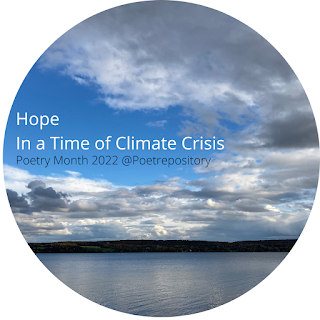When I was a kid,
local farmers raised sugar beets.
Migrant workers hoed acres of fields
by hand.
Junior Soliz ate everything on his lunch tray,
even the orange peel,
and we laughed at him.
When I was a teen,
I babysat Phil and Mary Sue’s irrigation,
monitoring the pump and the furrows.
Their corn was lush and tall and impossibly green.
The water was pumped up from the Ogallala Aquifer,
which is geologic water.
When it’s gone, it’s gone.
When I was a young adult,
my father died of lung cancer.
He had been an ag pilot,
drenching himself and the farm fields below his plane
with toxic chemicals,
not realizing he was causing
silent springs.
When I imagine the farms of the future,
their workers are valued.
They grow crops appropriate for their climate.
They give life, rather than taking it.
© Mary Lee Hahn, 2022
Looking back, it's astonishing to me that I grew up in a farming community that had been ravaged by the Dust Bowl years, and yet I learned nothing about the Dust Bowl, or what caused it, in school. Groundwater and the Ogallala Aquifer were not a part of our science curriculum.
My dad's cousin Bob insisted on using dryland farming techniques rather than succumbing to both the allure (and cost) of irrigation, as well as the government subsidies that funded crops requiring irrigation. But he was an anomaly.
Eastern Colorado is again in the midst of a severe drought, with dirt storms that last all day and reduce visibility to under a mile. I understand the enormity of shifting our agriculture system from huge agribusinesses to farms that are responsive to the land and climate. I understand that "huge agribusiness" can mean "land accumulated by families over many generations" and change can seem like an attack on a way of life. I understand. I am hopeful that change will come from the farmers and landowners.

I have some similar stories in my family, have possibly already shared with you. Maybe the government could start subsidizing those who take a new stance? Poignant poem, Mary Lee!
ReplyDeleteSometimes I wonder about how different your growing up experiences were, the places each of us and has never been, and yet how (as the kids say) we vibe. I am FASCINATED by this history of you and farming, sad to learn more about your beloved dad's life and death, and on my way to understand about aquifers. Plain-spoken, poetry essay. <3
ReplyDeleteHow absolutely tragic to have literally learned nothing from such a giant upheaval in history, to the point of not teaching it in school to the grandchildren and great-grandchildren of those whose world it upended. I'm sorry for your and for all of our loss - the time, truths and understanding lost to magical thinking and "it'll never happen to me."
ReplyDelete